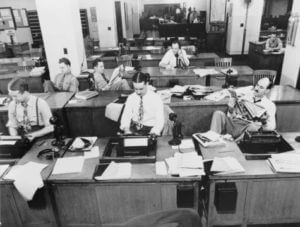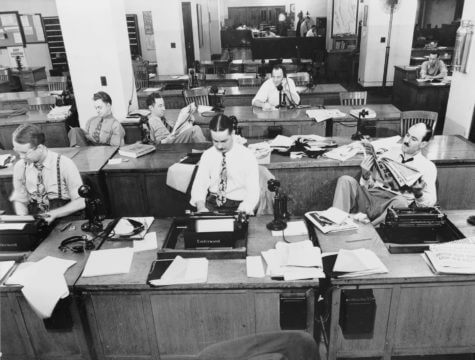EXETER, England — There is more to unbiased journalism than covering both sides of an argument equally.
A well-known principle of good reporting is that equal coverage should only be given to opposing ideas when they have equal merit. When this doesn’t happen, “he said, she said” stories emerge that often result in readers falling back on preexisting political beliefs.
In a new study out of University of Exeter, researchers have amassed evidence showing that, in many situations, reporters can and should do more to fact check in order to prevent such political bias from overshadowing facts. Particularly, the authors found that journalists should don referee stripes and adjudicate facts — or point out both truth and myth when reporting on political disputes.

“I wanted to test scenarios in which journalists could successfully influence readers’ beliefs even if their conclusions favored the opposing political party,” says study author Benjamin Lyons in a press release. “The danger is that adjudication may backfire – reinforcing people’s belief in the claims forwarded by their party, even if they are told they are wrong.”
Lyons noted that American journalists are most often implicated in passive reporting in which they simply repeat what they are told, rather than actively fact checking. Accordingly, the researchers recruited over 500 American readers to participate in their study.
The participants were then asked to read an article about nuclear power, as the subject is one that neither major party has a monolithic opinion about. That is to say, in the U.S. there are sizable portions of Democrats and Republicans that oppose nuclear power.
Readers were presented with an article covering a debate over the wisdom of going forward with a nuclear project. In the article, one side argued that it wasn’t a good idea economically and would hurt taxpayers. The political party making the argument against the project was altered in some of articles. Half of the articles presented included a section that vetted the claims of political party members with expert testimony.
“The study found readers believed the journalist over their party, and one-sided adjudication did not increase perceived bias. Readers also reported greater satisfaction of their informational needs,” says Lyons. “But of course there are some issues in the news where it will be more difficult to adjudicate. I think the more specific the issue, location or event in question, the more influential adjudication would be. Journalists may find targeting narrow claims a fruitful approach to inject a small amount of factual understanding into even contentious debates.”
The study comes as other researchers scientifically investigate the growing popularity of fact checking in this era of “fake-news” and social media soundbites.
“This is an incredibly important time to be a journalist,” says journalism professor Yanick Rice Lamb in an American Press Institute article on the future of fact-checking. “Never has the watchdog role been more important.”
The article noted that API was also sponsoring several new studies into the efficacy of fact checking, working alongside the Poynter Institute to advance understanding of the practice.
In another article, Director of the International Fact-Checking Network at the Poynter Institute Alexios Mantzarlis pointed out five other recent studies on fact checking, many of which showed that fact-checked information won out over political bias.
“The fake news phenomenon led to an explosion in media coverage of fact-checking in the final months of 2016,” Mantzarlis says. “Now academia, with its slower publication process, is catching up.”
One of the studies Manzarlis mentions found that high critical thinking ability was more important than party bias when it came to identifying false news headlines. He gives the following example of the type of question used to evaluate critical thinking ability in that study:
“A bat and ball cost $1.10 in total. The bat costs $1.00 more than the ball. How much does the ball cost?”
While the study obviously involved more than one question, the implication is that people who are able to get the correct answer are more likely to be able to spot misleading news.
Though other studies have likewise emphasized the importance of critical thinking by readers when it comes to forming evidence based opinions, Lyons says his latest research shows that reporters themselves can do much more to help.
“This study should give journalists encouragement as they think about how to present facts in the current climate. It adds to growing body of work that shows fact checking can be successful, particularly when targeting claims less central to individuals’ identity,” Lyons says. “This suggests they can take a more assertive approach to adjudicating the facts.”
The study findings were published recently in the International Journal of Public Opinion Research.

I am torn in adjudicating this article. Has the author failed in his herein-described duties? Or is my internal division of opinion simply because I am really a critical thinker? (Yeah me!)
Honestly, I think that if the study is well reported, and I think it is, it was a pretty sensible study, but dangerous in deciding on a recommended course of action based on the results, because it omitted a necessary step in honest journalism, that of admitting to readers one’s prejudices if any exist; and a journalist (or anyone else) would probably have to be bored to tears by a subject to write without prejudice on it.
As a relevant aside, I applaud the reported study for finding a question to test ‘critical thinking’ which is purely mathematical, and therefore objective, but does not require higher education or a high tolerance of boredom, to understand.